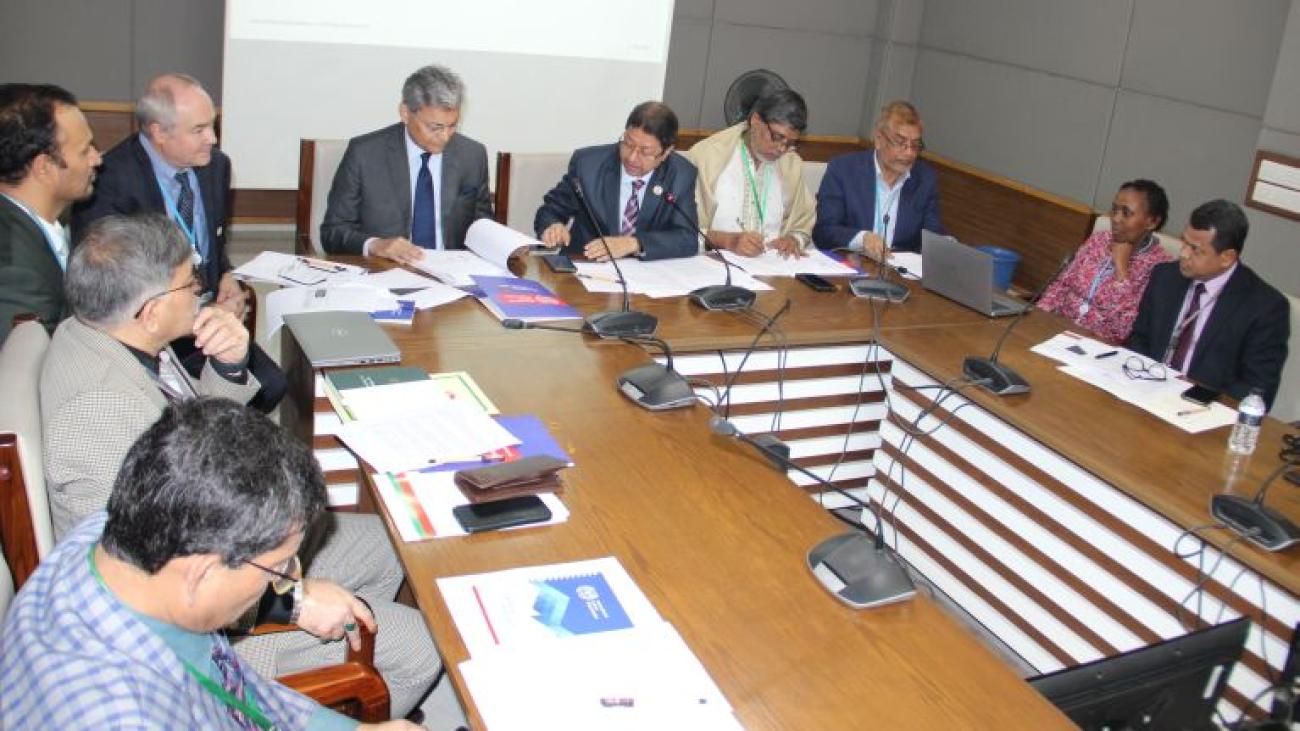Bangladesh Tripartite Decent Work Country Programme Steering Committee begins 2024 reflecting on progress

Labour reforms, green jobs for a just transition and private sector driven skills development to be prioritized in 2024.
31 January 2024
The Bangladesh Decent Work Country Programme (DWCP) Steering Committee comprising representatives from the Ministry of Labour and Employment (MOLE), the Bangladesh Employers’ Federation (BEF) and the National Coordination Committee for Workers’ Education (NCCWE) held their first meeting of the year on 31 January 2024 to reflect on the progress towards increasing decent jobs as the country gears for LDC graduation.
The Ministry of Labour and other tripartite constituents – workers’ and employers’ organisations discussed how to implement the national action plan that will consolidate ongoing reforms in the labour sector and position the country for solid economic growth after LDC graduation in 2026.
In addition to supporting reforms in labour administration and governance, the ILO together with constituents have contributed to monumental reforms in skills development leading to adoption of the Bangladesh National Qualification Framework (BNQF) for skills in March 2023, and the successful rollout of a pilot employment injury scheme over the past two years, providing compensation and income security for workers and their families in the event of injury at work or work-related death.
The ILO continued to foster social dialogue on key issues impacting creation of decent employment in support of the Government’s vision of creating 30 million jobs by 2030 and advancing universal social protection.
Labour Secretary Md. Ehsan E Elahi reported that the Government had formulated the country’s first-ever National Employment Policy 2022 and was leveraging social dialogue to develop alternative dispute resolutions mechanisms.
“We have the Industrial Relations Institute for capacity building of employers and workers to promote harmonious industrial relations in Bangladesh,” the Labour Secretary said. “Building social awareness and capacity is needed to ensure effective social dialogue as is being done by the Department of Labour,” said Elahi.
The Decent Work Country Programme Steering Committee, which meets twice a year, is the primary champion of SDG 8 – promoting creation of decent work and economic growth.
The Chairman of the Bangladesh Employment Federation (BEF) Ardashir Kabir commended the DWCP for addressing the key factors required to create decent employment including promoting the adoption and implementation of international labour standards and workers’ rights, addressing gender inequality in the world of work, and the elimination of gender-based violence.
“The significance of DWCP lies in its coverage of skills training programmes, employment policies and programmes, social protection schemes, labour rights and other related issues,” Kabir said. “BEF recognizes the success of the DWCP, hinges on effective collaboration, dedication and engagement of all stakeholders including employers’ organizations, trade unions and the government at both national and local levels.”
He called for regular progress updates so that partners can continue to be informed and participate in influencing positive changes on decent work and underscored the need for cooperation among all stakeholders to ensure successful implementation of the Decent Work Country Programme 2022-2026.
Kabir also emphasized the importance of businesses embracing human rights as the country prepares for LDC graduation in 2026 to retain competitiveness and sustainability in global supply chains.
“We should raise awareness among both employers and employees about responsible business conduct. We also want to highlight the benefit businesses can get from alternative dispute resolution methods, which are essential for maintaining decent work environments,” he added.
The representative of the National Coordination Committee for Workers’ Education (NCCWE) Naimul Ahsan Jewel reiterated NCCWE’s commitment to taking forward adoption and implementation of international labour standards.
“If we are to make progress in the SDGs, the increased participation of workers’ organisations in labour law reforms is crucial,” said Jewel.
The ILO Country Office also briefed the Steering Committee on the Global Coalition for Social Justice endorsed by the ILO Governing Body in November 2023, and the Global Accelerator on Jobs and Social Security for Just Transitions, a UN initiative launched in September 2021 by UN Secretary-General to accelerate progress towards the creation of decent jobs, primarily in the green, digital and care economies, and to extend social protection to people who are excluded.
The DWCP Steering Committee expressed interest in learning more about the modalities of joining the Global Accelerator on Jobs and Social Security.





